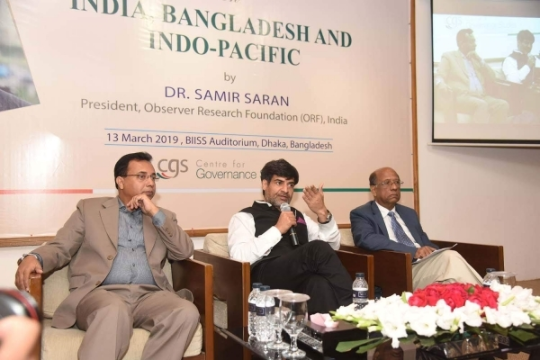India, Bangladesh & The Indo-Pacific
13 March 2019
pl2
The Centre for Governance Studies organized a public lecture on “India, Bangladesh and Indo-Pacific” on 13 March 2019 at the auditorium of Bangladesh Institute of International and Strategic Studies. The Public lecture was given by Dr Samir Saran, President of the Observer Research Foundation, one of Asia’s most influential think-tanks. Samir writes frequently on India’s foreign policy as well as issues of global governance, climate change, energy policy, global development architecture, artificial intelligence, cyber security and internet governance. He is the author of four books and numerous academic papers, and is featured regularly in Indian and international print and broadcast media. In addition, he curates the Raisina Dialogue, India’s flagship platform on geopolitics and geo-economics, and chairs CyFy, India’s annual conference on technology, security and society.
He is a Commissioner of the Global Commission on the Stability of Cyberspace, member of the World Economic Forum’s South Asia advisory board and the Global Future Council on Cyber security, and Director of the Centre for Peace and Security at the Sardar Patel Police University, Jodhpur, India. The public lecture was held against the background of huge expectations of benefits that Bangladesh is yet to have from increased connectivity and regional and sub-regional cooperation. And also keep it in mind that the politics of the Bay of Bengal and the larger Indo-Pacific region will dynamically shape the emerging political order in this century. The public lecture brought together some best minds of Bangladesh comprising political leaders, bureaucrats, scholars, diplomats, economists, policy analysts, business leaders, and media personalities to interact with the key speaker on the issues and provide future directions.
Building a pluralistic and liberal democratic society is a common challenge for both Bangladesh and India, Dr. Samir Saran said in his lecture. Both the countries are facing the risks of extremism and militancy, he added. Dr. Samir said, Bangladesh and India need to move beyond the government to government (G2G) mechanism creating a stronger bonding within communities for greater good as the two countries will become important economic actors in the region in the next 10 years. Both the courtiers can work together to serve common interests in the region, particularly in the areas of regional connectivity, infrastructure development, energy and technological development. To protect the regional interest, the two countries can work together while negotiating with global powers like the USA, China and Japan.
Stressing the need for enhancing people to people contact, he said this is necessary because it would help resolve many pending disputes. “We need far more people to people engagements, far stronger community engagements and cultural intimacy. It is disappointing that the countries did not see more people like Rabindranath Tagore who are cultural icons of both sides of the border,” he said. “I do sense that we are under performed as a region. We are under performed as neighbors. We are the least integrated of all regions in the world.”
Dr. Samir pointed out that academics, artists, business community and grassroots workers of the two countries need to be far more integrated than they were in the past. India and Bangladesh must start creating a favorable international ecosystem as two countries have similar vision, Dr Saran said, highlighting the importance of building strong institutions. Responding to a question, he said that though India did not take part in the Belt and Road Initiative of China both the countries had jointly invested in many sectors. In this connection, he cited the example of the Asian Infrastructure Investment Bank (AIIB) where India is the second-biggest stakeholder.
CGS chairman Dr Ataur Rahman made the welcome remarks in the event, which was moderated by Zillur Rahman. The Seminar concluded with an optimistic note of Bangladesh’s ability to be a ‘game-maker’ or a ‘player’ so that it can take the expected benefits of regional and international strategic political and economic order.
